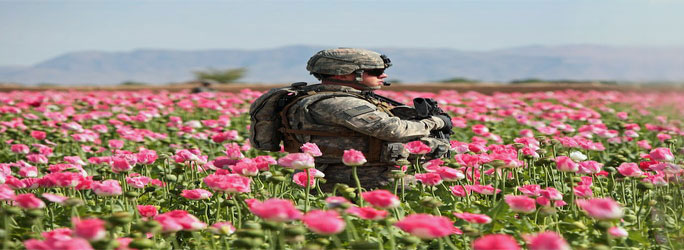Alwaght-According to report released by UN office on drugs and crimes, Opium poppy cultivation in Afghanistan hit an all-time high in 2013 since America invasion of Afghanistan in 2001, under the pretext of fighting terrorism.
The U.N. Office on Drugs and Crime reported that Afghan farmers grew an "unprecedented" 209,000 hectares (516,000 acres) of opium poppy in 2013, a 36 percent increase from 2012. Land area used for opium cultivation in Afghanistan surpassed the previous high of 193,000 hectares (477,000 acres) in 2007, said John Sopko, the special inspector general for Afghanistan reconstruction.
"The recent record-high level of poppy cultivation calls into question the long-term effectiveness and sustainability of those prior efforts," he said.
Afghanistan produces more than 80 percent of the world's illicit opium, and profits from the illegal trade help fund the Taliban insurgency. U.S. government officials blame poppy production for fueling corruption and instability, undermining good government and subverting the legal economy.
Sopko said the U.N. drug office estimated the value of poppy cultivation and opium products produced in Afghanistan in 2013 at about $3 billion, a 50 percent increase over the $2 billion estimated in 2012.
"With deteriorating security in many parts of Afghanistan and low levels of eradication of poppy fields, further increases in cultivation are likely in 2014," Sopko said in the letter.
After America invasion, Opium poppy cultivation not only is not declined, but also is increased greatly. Because affordable deep-well technology brought to Afghanistan over the past decade had enabled Afghans to turn 200,000 hectares (494,000 acres) of desert in southwestern Afghanistan into arable land, much of it devoted to poppy production.
The U.S. Embassy in Kabul, in a letter responding to the findings, said the rise in poppy cultivation and decline in eradication efforts by provincial authorities was "disappointing news".
Michael Lumpkin, the assistant secretary of defense for special operations and low-intensity conflict, said in a response letter that the Pentagon had supported counter-narcotics operations by other America government agencies but was not responsible for managing poppy eradication programs.
America assistant secretary of defense, disclaiming responsibility, blamed Afghan government, and said, "In our opinion, the failure to reduce poppy cultivation and increase eradication is due to the lack of Afghan government support for the effort".


























